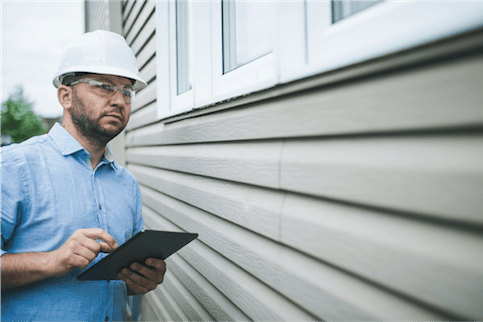It’s easy to get swept away in the excitement of buying a new home, but it’s important to become familiar with the different types of home inspections before you close the deal. A home can look perfect on the outside but have underlying issues that impact its value and longevity. This is why it’s critical to have a home inspection done on any house prior to finalizing the purchase.
Let’s take a look at the different types of home inspections you can invest in as you move forward in your home buying journey.
How Does A Home Inspection Help Buyers?
Home inspections help you figure out whether you’ve found the right house.
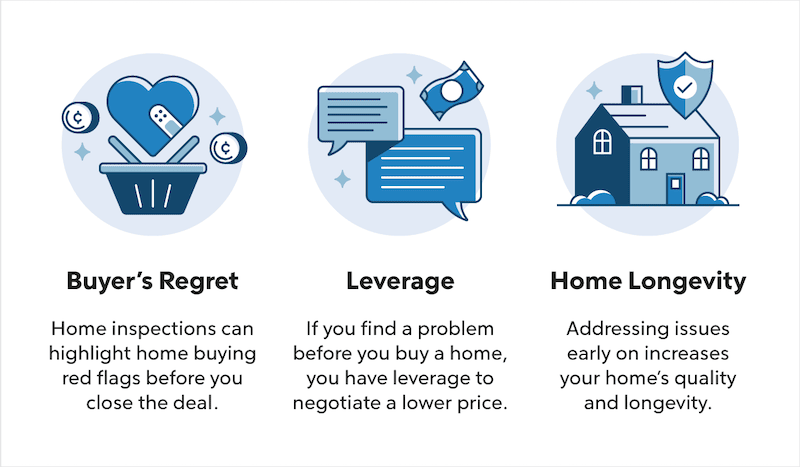
Here are the benefits of conducting a home inspection before you buy:
- Avoiding buyer’s regret: Home inspections help you identify any home buying red flags before you close the deal.
- Leverage: If you find issues with the home, you have leverage to negotiate a lower price.
- Home longevity: By addressing issues early on, you can increase your home’s quality and durability.
Assuming you have a home inspection contingency in your purchase agreement, you might decide to walk away from the sale or negotiate for a lower price.
Once your inspection is complete, your home inspector may suggest you get one of the specialty inspections discussed below.
See What You Qualify For
Buy A Home
Discover mortgage options that fit your unique financial needs.

Refinance
Refinance your mortgage to have more money for what matters.
Tap Into Equity
Use your home’s equity and unlock cash to achieve your goals.
What Inspections Are Needed When Buying A House?
If a general inspector finds warning signs of mold or pests in your perhaps soon-to-be-new home, they might suggest having a specialist take a look at it. A specialty home inspector will diagnose the problem and estimate the cost to remedy it.
Up next are several types of home inspections you might come across and want to consider ordering up during the home buying process.
1. Roof Inspection
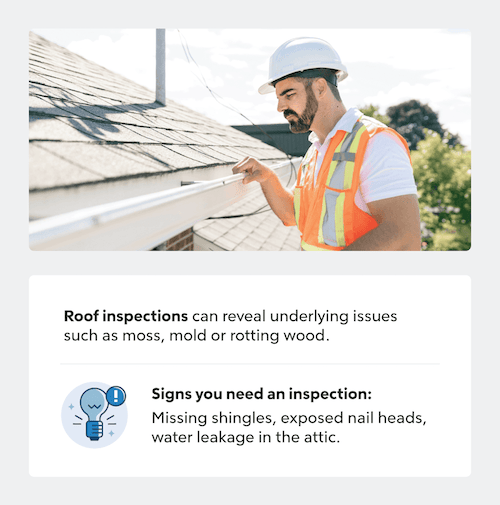
Roofs can experience issues such as moss, mold, rotting wood or damaged shingles. If left unchecked, these problems can escalate, requiring you to pay for a new roof or a professional cleaning to remove any health hazards.
Warning signs:
- A roof over a decade old
- Missing shingles
- Exposed nail heads
- Water leakage in your home or attic
Who can help:
Ask your real estate agent, friends and family for recommendations on a reputable roof inspector licensed by the National Roof Certification and Inspection Association (NRCIA).
2. Chimney Inspection
Neglected chimneys can lead to unintended house fires, carbon monoxide exposure and water damage. A chimney inspection can diagnose buildup of creosote – a flammable material – and harmful obstructions such as twigs and leaves. Chimney inspections normally cost $150 to $500.
Warning signs:
- Crumbly black soot on the walls inside the fireplace
- Buckling brick or stone around the fireplace
- Clicking or rumbling sounds inside the chimney
- Water at the base of the fireplace
Who can help:
A chimney specialist certified with the Chimney Safety Institute of America (CSIA) will be able to best assist.
3. Electrical Inspection
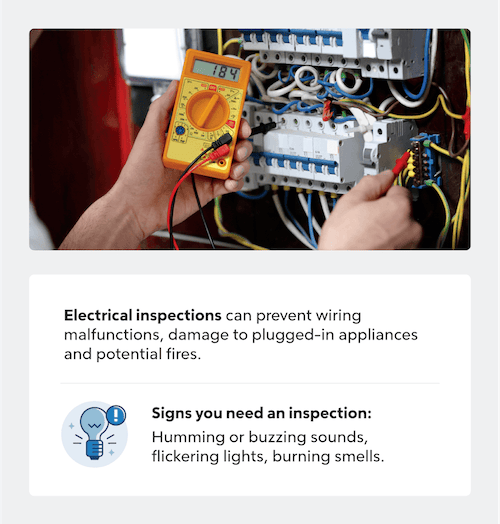
Exposed and frayed electrical wires can cause malfunctions, damage to electric appliances or sparks that lead to fires.
An electrical inspection helps identify and prevent these problems while ensuring your electrical systems are running efficiently and safely.
Warning signs:
- Hums or buzzing sounds from wiring
- Flickering or dimming lights
- Burning smells from an outlet or fuse box
Who can help:
Your agent can refer you to a licensed electrician registered in your local area. Note that working with unlicensed electricians could void your homeowners insurance.
4. Crawl Space Inspection
An unchecked crawl space can lead to poor indoor air quality and increased heating and cooling bills. Excessive dampness in your crawl space causes wood rot and rust, which can damage the structures supporting your home. Damage isn’t always visible to an untrained eye, which is why a professional must take a look.
Warning signs:
- High indoor humidity
- Sounds of animal movement
- Cracks in your foundation
- Uneven floors
Who can help:
General home inspectors can perform crawl inspections but can’t always solve the issues that arise. Depending on the diagnosed problems, you may need to enlist help from a mold remediation company, an HVAC professional or a foundation repair professional.
Home Inspection Checklist
Learn what your home inspection covers and what it doesn’t.
5. Lead-Based Paint Inspection
Lead-based paint is common in older homes built before 1978 – the year it was banned. Lead paint is still present in modern homes, sometimes hidden below fresh layers of paint. Lead poisoning can cause muscle weakness and nausea in adults and developmental and other health problems in children.
Warning signs:
- The home being built before or around 1978
- Chipped or peeling paint
Who can help:
Lead-based paint inspections must be performed by the U.S. Environmental Protection Agency or a firm the EPA authorizes. Visit the EPA’s website to find the options available in your state.
6. HVAC Inspection
A neglected HVAC system could lead to uneven temperatures, carbon monoxide exposure or the need to replace your entire system. An HVAC inspection prevents unexpected breakdowns and ensures your equipment is running efficiently and safely.
Warning signs:
- An inaccurate thermostat
- Strange noises coming from the HVAC unit
- Uneven temperatures around the house
Who can help:
Ask your agent to refer you to a local, licensed HVAC technician. Check a technician’s third-party reviews and licensing information online to ensure you’re in good hands.
7. Septic System Inspection
Septic tanks are necessary for disposing of water and waste from washers, sinks, showers and toilets. Your inspector will determine if the system needs to be pumped, if it’s operating properly and if it has any cracks or structural issues. The Washington State Department of Health recommends inspecting your system once every 3 years.
Warning signs:
- Puddles in the yard
- Greener patches of grass over the septic area
- 3 or more years having passed since the last inspection
Who can help:
To solve any septic issues, you’ll need a plumber or a septic tank professional. Plumbers are the cheaper option and can solve most blockage or drainage issues, but you must hire a septic professional for problems with the septic tank itself.
8. Pest Inspection
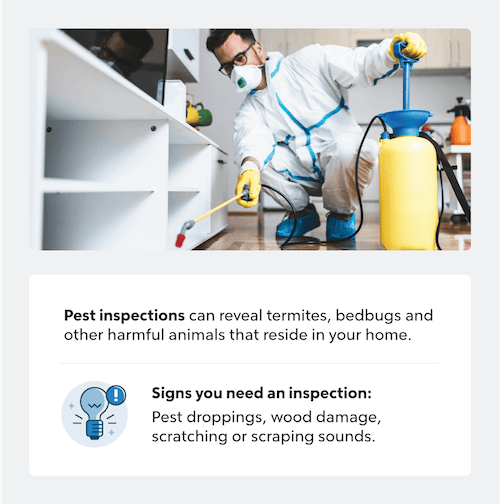
Bedbugs, cockroaches, rodents and other pests can cause health hazards to both a home and the people living in it. Termites can damage the structure of your home, while rodents and bugs can spread diseases.
Since pests can find their way in your home through wall crevices or damaged floorboards, pest inspections may also help you identify other damages to your home.
Warning signs:
- Pest droppings
- Wood damage to the home
- Scratching or scraping sounds
Who can help:
Search for local, licensed pest companies with positive third-party reviews.
9. Radon Inspection
A report by the National Research Council suggests that radon is the second leading cause of lung cancer in the U.S. Radon testing is important for a home so you can limit your exposure and protect your health. Radon can enter the home through crawl spaces, basements, cracks or windows.
Warning signs:
Since you can’t see, taste or smell radon, it has no warning signs. The only way to find out your home’s radon levels is to test for it.
Who can help:
You can conduct a radon test by yourself, or you can hire a professional. Contact your state radon office for a list of qualified radon testers and to find out if you qualify for any discounted or free radon test kits.
10. Soil Inspection
Soil inspections are particularly important for homes on hillsides. A soil stability inspection ensures the earth under your home won’t erode, resulting in an unstable foundation. You might need a soil inspection if you’re in an area known for soil contamination.
Warning signs:
- Your home sitting on a hill
- Being in an area known for soil contamination
Who can help:
Search for soil engineers, also known as geotechnical engineers, in your area to schedule a soil inspection.
11. Asbestos Inspection
Asbestos materials were frequently found in construction supplies for homes before the 1980s. Exposure to asbestos in the air can increase your risk of developing lung cancer, mesothelioma, asbestosis and other harmful diseases. Although asbestos can only be identified through lab testing, you’re more likely to have asbestos as your home ages.
Note: If you find asbestos in your home, don’t disturb it until a professional looks at it. Asbestos is mostly safe, as long as you don’t touch it or interact with it.
Warning signs:
- Your house being built before the 1980s
- Your house having corrugated roofing
- Your house having vinyl flooring tiles with millboard
- A cement water tank being in your house
Who can help:
Asbestos abatement professionals can locate and safely remove asbestos from a home. Certification requirements for asbestos remediation may vary by state, so check your state’s requirements, as well as reviews for any companies you’re considering.
12. Mold Inspection
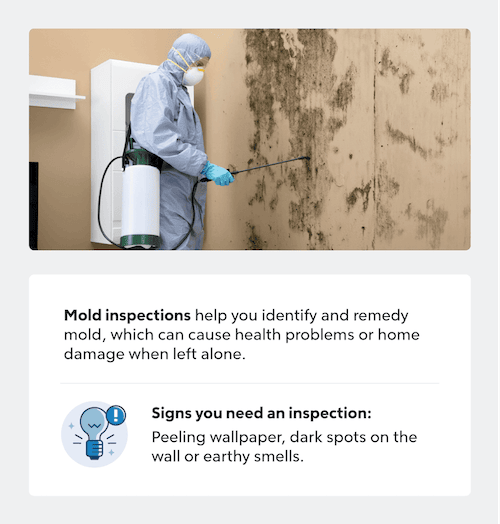
Mold spores will flourish on any surface where it’s moist, whether indoors or outdoors.
This means any area that has experienced water damage or high rates of condensation is susceptible to mold. Mold can produce allergens, mycotoxins and irritants that can cause health problems, particularly for people with weak immune systems.
Warning signs:
- Bubbling, cracking or peeling wallpaper
- Dark spots on the walls
- A musty, earthy smell
- Signs of water damage
Who can help:
According to the EPA, you can remove the mold yourself if a moldy area is less than 10 square feet. If the infestation is larger, you’ll need to hire a mold remediation company.
13. Plumbing Inspection
Plumbing issues can result in dripping faucets, low water pressure or leaks that can cause mold or mildew problems. It’s crucial to inspect your plumbing for corroded or leaky pipes and ensure your water heater is working properly. Catching these issues early helps you avoid home damage and costly repairs.
Warning signs:
- Low water pressure
- Discolored water
- Strange smells
- Discolored pipes
Who can help:
A professional plumber can diagnose any issues with your system. Licensing requirements vary by state, so research the plumber’s credentials and previous experience before hiring them.
14. Foundation Inspection
The foundation of your home supports your home structure while keeping out groundwater and providing insulation. An unreliable foundation can cause cracked walls, uneven floors, mold damage and jammed doors while reducing the value of your home. While many foundation issues are cosmetic, an inspection should give you peace of mind.
Warning signs:
- Gaps between walls or doors
- Slanted or sagging floors
- Leaning chimney
- Exterior cracks
Who can help:
Foundation inspectors, also known as structural engineers, can examine your foundation and diagnose potential issues. Mortgage lenders sometimes provide lists of nearby, reputable structural engineers.
15. Pool And Spa Inspection
Pools need regular maintenance to remain sanitary and safe. A pool inspection ensures plumbing lines are free of leaks and that pool lights are properly functioning and mold- free.
Warning signs:
- Cracks in the cement or plaster
- Worn or rusting ladder or diving board
- Visible algae
- Burned out underwater bulbs
Who can help:
Certified pool inspectors can diagnose any issues and offer solutions for your pool. Some home inspectors offer pool inspections bundled with their general inspection, but make sure they’re qualified before you accept.
The Bottom Line: Home Inspections Help Protect The Potential Home Buyer
A standard part of the home buying process, home inspections protect the buyer and ensure the buyer understands the full condition of their potential new home. Several types of home inspections are available, covering everything from the soil and foundation up to the roof shingles.
Ideally, a home will pass inspection with flying colors or, worst-case scenario, highlight a few minor repairs. If an inspection reveals severe issues, you might negotiate a lower purchase price or walk away from the deal completely.

Victoria Araj
Victoria Araj is a Staff Writer for Rocket Companies who has held roles in mortgage banking, public relations and more in her 15-plus years of experience. She has a bachelor’s degree in journalism with an emphasis in political science from Michigan State University, and a master’s degree in public administration from the University of Michigan.
